
We're
in Asia now. Susan kind of looked at me funny when I would say that
Japan seemed more like Europe than the Asia I remembered. My last
trip here was Thailand, Cambodia and Viet Nam. The dusty hustle and
flow of those countries did not match the clean and ordered masses of
the Japanese streets. But we're in complete agreement now; we are
definitely in Asia.

Shanghai
is very alive. Everywhere there are people, never an empty sidewalk
or deserted street. As we walk we're weaving through people; some on
their way somewhere and some tending their shop or chores on the
stoop. Like southeast asia, life is lived on the street. There is
the sidewalk bicycle repair shop, we saw a pair of men using an arc
welder to patch together a hand-cart, and it seems every third door
has someone selling produce, or preparing the groceries they just
bought. Traffic roars by, with the growl of the double-banger
motorcycles and the slow squeeks of bicycle-trucks. The traffic is
relatively ordered, with red lights by and large obeyed, and few
bikes on the sidewalks.

It's
dirty here. Literally. The whole city is covered with a layer of
dirt, not just dust, that has settled out of the air onto every
imaginable surface. The dirt comes from the construction, I suspect,
which is also ubiquitous. Nearly every block has a new building
going up, and it took us quite a while to find refuge from the sounds
of the jackhammers ripping out the streets and sidewalks.


After
the reserve and fastidiousness of Japan, it's a bit of a shock at
first. And it didn't take long for our introduction to it. As we
deplaned last night the first thing we saw was a uniformed policeman
spitting on the jetway floor, and the first thing we smelled was...
well it smells something like wet horse. It's better right now
(Wednesday noon-ish) but was there all last night and all this
morning. I don't know if it depends on the prevailing winds or if we
have walked into a less polluted part of the city.
The
spitting is sort of funny. At first your natural reaction as a
westerner is a mix of curiosity and mild disgust. But then you start
walking around the city. Soon you realize you are breathing almost
exclusively through your nose because the air bothers your throat.
You sneeze a bit. On a particularly dusty street the tickle in your
throat is becoming a benign but persistent cough. Now you understand
it, this isn't just a cultural difference but also a reaction to the
difference of the environment. Like a tradition of removing shoes in
a rainy country, the norms are suited to make life more comfortable.
The
streetscapes are also much more distinct. We breakfasted in a cafe
along a little arts district walk-street in the former French
concession. A gallery there had a lot of really striking photographs
of Shanghai; this is a very photogenic city. Present here are all
the contrasts that make Asia so romantic for the adventurous
traveller. The contrast of modern and historical, rich and poor, new
and run-down. The dichotomies of the subject are shared by the
images themselves. After the rich tones of Japan, green trees,
bright flowers, bold tile roofs and freshly painted walls, Shanghai
is like a sepia photograph of itself, muted by the dust and dirt.
Rather than cherry blossoms the sudden accent of color comes from the
wash hung out of every window, and in the background, one of the
towering stupas of steel and glass housing the newest Buddha of
China, commerce.

As
an engineer, I am impressed by the practicality you see outside
America. As an iPod and iMac owner I'd be a hypocrite to wantonly
disparage the contributions of the design movement. But it has
created a wedge between people and their mechanisms. The stress of
form over function is to a point where we in the west don't really
have a good handle on what things are capable of, only of what we use
them for by tradition. The necessities of scarcity in other
countries leaves no room for this luxury, and here people exhibit a
wealth of practical innovation. “Waste not want not” and here
things are used and reused, and not replaced or disposed of until
they can truly no longer serve. Even then, things will typically be
reappropriated to a new function. A plastic bag will be used and
reused until it finally gives out, and then it may very well find use
as windowing or rupholstery for a bicycle seat. As we were walking a
woman pulled over on her motorcycle, pulled out a wrench, made some
adjustments and was on her way. The “taxi” (more on that later)
that we took last night was banged up and dirty, devoid of any style,
on the tail end of it's shocks and hardly had a clutch – but it ran
and gave it's owner a livelihood. On the washroom at the restaurant
for lunch the faucet was loose in it's fixture and you sort of had to
hold it up with one hand as the water ran over your other hand –
but it was water tight and clean. So much of what we have in the west
is over-engineered, and really capable of so much more than we use it
for. Here they push things to their limit, of course what you trade
is safety and reliability, but when walking around your home city
requires regular games of chicken with speeding traffic and dodge-em
with motorbikes, safety is very relative.
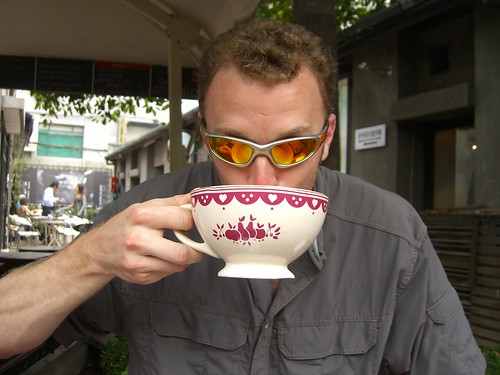
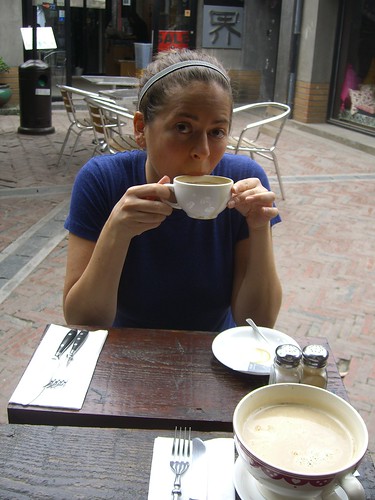
By
lunch of the frst day we were pretty deep into the former French
concession. The streets are still tree-lined, and many of the old
houses still stand. This is also a big expat at tourist area, and
the stores, restaurants and galleries all reflect the western
clientele. As she read the post, Susan said I had overlooked the
charm of the city. With a full belly I tried to agree, and at times
in this area I could almost.


But
it is definitely interesting. Houses that formally would be for a
single family have been carved up into apartment blocks, with two or
more families per floor. The gardens completely neglected if extant
at all. Many paved over with salvaged bricks and tiles for use as
areas to dry laundry.
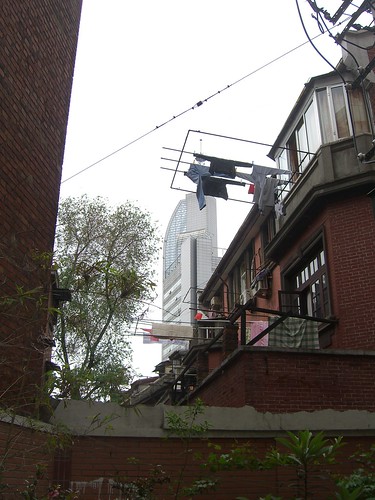
That
night we walked along the Bund, the riverfront. It's “golden week”
here and a major holiday. This has only swelled the ever present
crowds, but it was fun to see the local hordes recreating. The Bund
provides a great view of the skyscrapers across the river n Pudong.
Twenty years ago it was rice paddies (literally) today, sky-scrapers
as far as the eye can see. And along the Bund itself, lots of little
tchotke peddlers with all sorts of crap (most of which lights up) but
oddly all with the same crap, each pitch a carbon copy of the
previous one.

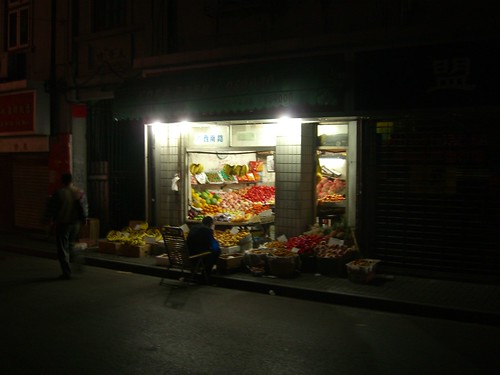
Thursday
we got up from our pile of bricks that is a mattress (I literally
pulled up the sheet to see if it was some sort of adapted bedspring)
and went across town to get tickets for an Acrobat show the next
night. The subway here is clean and prompt, but the stations are
pretty far apart. The trains leave every two minutes, and get you to
your destination swiftly, but because they integrate such a large
area they are always packed (and I do mean packed, no photos in the
car because there was no way I could have dug my camera out of my
pocket). Walking to the box office we passed store after mall after
store, and mostly western brands. Shanghai is one giant shopping
mall, Susan said it's like being trapped inside the Beverly Center
with 20 million people.


The
dress here is completely western, more casual than Japan. The sea of
T-shirts and jeans broken by the occasional uniform. At first you're
thinking there are a lot of police here, especially because that's
what we're led to expect by what we read at home. But then you
realize a lot are “Parking assistants” or private rent-a-cops
hired by the store or the mall or whatever. This got me thinking
that America must be a really confusing place to visit, and
intimidating in a lot of ways. The proliferation of private security
in recent years means lots of people with badges (though they don't
mean anything) and more than a few walking around with guns. One
could easily get the impression that in the US, we live in a police
state.

Billboards
are everywhere, stores are everywhere, and there was even a brass
band promoting one place. This is not the China of old (or even 20
years ago). This is a big developed city, only more commercial. It
is very strange to see thousands of Chinese shopping in some mall,
and two blocks away you have what to western eyes are tenements with
almost all the paint peeled from disrepair.

Like
everyone in the west, I've read a lot about the development of China.
But to see it... It seems to me this isn't just some flash in the
pan Pacific tiger economy, or that this is a bubble waiting to burst,
this is irreversible. Though I'm sure this is what many people said
about Cambodia, or Zimbabwe, or any number of other “success
stories” that went bad. Time will tell, but I don't envy the
economic planners at the central office trying to thread the needle
between modernizing the economy and avoiding the risks of political
instability posed by such visible economic disparities. To
paraphrase Josh, and old college friend of Susan's, 'the danger of a
command economy is what happens if someone makes a mistake'.
We
met up with Josh Thursday afternoon after an unsuccessful attempt at
going to the Shanghai museum. This had been the plan for the day
after getting our tickets; stroll through the museum, meet an old
friend for drinks. But the line for the museum... well, I took a
photo.

Anyway,
we met Josh for a drink, and then he took us for dumplings at a cool
little street that is all food vendors. Then we hit up an American
bar/cafe for more dinner and some Jazz. Lots of fun.
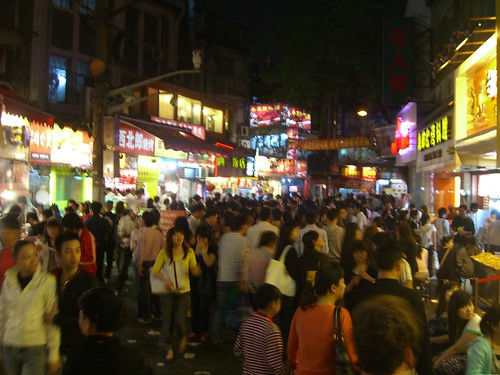
Friday
was pretty easy going, more exploring the city on foot and eventually
ending up at the theater for the acrobats. OK, so evidently this is
THE thing to do when visiting Shanghai. Almost the whole theater was
filled by groups of westerners who filed in behind their little tour
leader holding up his flag. Nonetheless the show was great, worth
the price and the guy behind us who provided a running commentary of
“no way, that's impossible, she must be double jointed!” Susan
thought he was the best part, I was ready to report him to the secret
police.
It
was a great show, and we had a fun drink before at a little bar
across from the theater. But this too was an expat bar. It is
actually really, really hard to get off the western tourist/expat
circuit in this city. The language barrier is huge, much more than I
expected, and the attitude of the locals is kind of surly. We got
lots of looks that seemed to say “It's so crowded we're only
allowed one kid, why are you here adding to the problem?”

But
the language barrier also got me thinking about home. I'm finding
picking up a couple of words of Chinesevery difficult, for example
there is no one way to just say “no”, it always depends on
context. But English, with its double negatives, negative
understatements to mean hyperbole, liberal use of slang or French or
Latin or Spanish must be nearly impenetrable. One of the little
games we play from time to time is “what would the guidebook say
about America.” It helps us to remember that the signposts or
guidebooks can easily have characaturized versions of things. Like
when you sneeze in America “it is polite to say 'God Bless You'
because the Americans believe that evil spirits cause sneezing and
illness and this scares away the evil spirit.” So in that sense
you can imagine the guidebook to “City Angels of” telling them to
order “cow meat cooked on skillet” and “egg of chicken fried to
look like sun” for a traditional local breakfast. It helps keep
things you read in perspective. But anyway, I have a whole new level
of appreciation for people who visit the States and don't speak
English or why many immigrants chose to live in communities comprised
of their countrymen.
Finally,
Saturday morning, after what felt lke an eternity spent in purgatory
(though it was only 3 days), we got on the train for Hangzhou. We
had fun together, got to do a lot of people watching and get a real
'beat' on Shanghai, but didn't really find anything in the city to
cling to. It's like a giant, crowded mall on Christmas Eve,
surrounded by a giant slum, and most of the things old enough to have
character was razed or destroyed by neglect.
